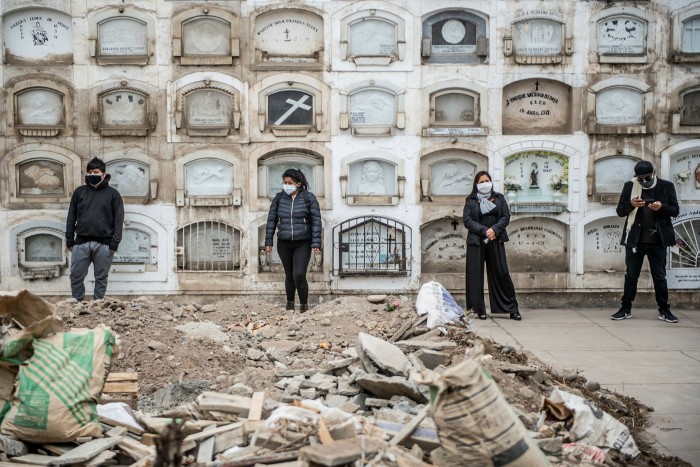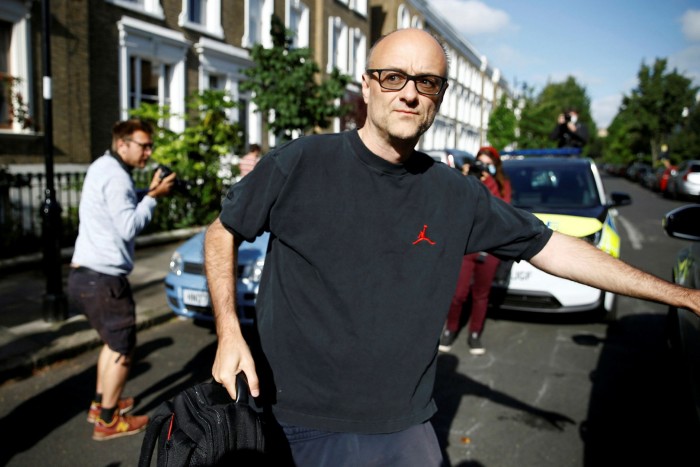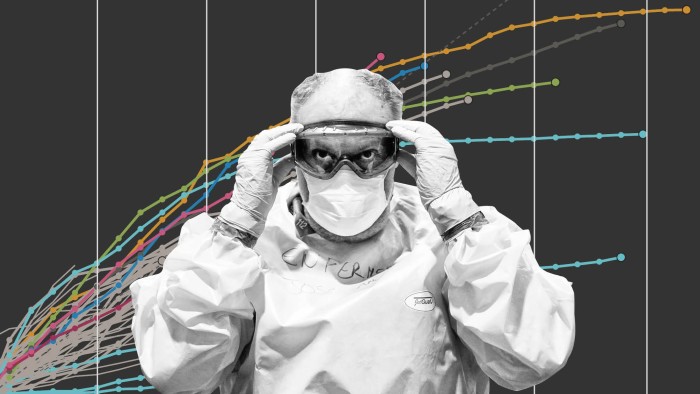Grief, lockdown and coronavirus: a looming mental health crisis

Roula Khalaf, Editor of the FT, selects her favourite stories in this weekly newsletter.
In almost 29 years of marriage to a rabbi, attending many of her Jewish community’s significant life events, Susannah Kraft had never attended a virtual funeral. Then in March, she went to her husband’s.
The service for Rabbi Neil Kraft, the 69-year-old father of their two sons and wrestling superfan who she describes as wise, mischievous and kind, was extremely personal. Nonetheless, she says, it felt “one removed — we weren’t there”.
Mourners may have been distanced physically by the coronavirus pandemic that claimed her husband’s life but hundreds showed up virtually: more than 1,300 smartphones, tablets and laptops logged on to the live-streamed funeral.
There were some upsides to the format: it enabled overseas and elderly friends and relatives, including Ms Kraft’s 93-year-old mother, to participate from home. There were also poignant absurdities, like Ms Kraft’s son who was self-isolating outside the family home, forced to watch by going on a Skype call with his cousin in Spain after losing his connection.

But overall, the disruption to the traditional funeral, burial and mourning rites has been disorientating. “It’s very difficult,” says Ms Kraft, who was allowed to visit her husband's grave this weekend. “The grieving and mourning when you haven’t actually been to the grave, it enhances the air of surrealness. Everything’s magnified; when are we going to go to the cemetery, who knows? When are we going to see family, who knows? Time is stretchy.”
Just as the global pandemic is forcing a reappraisal of the way we work, socialise and travel, so too for death.
From Bergamo to Brooklyn, Lille to London, the events of recent months have been so fast-moving that it can sometimes be difficult to take in the immensity of the personal trauma so many people have gone through — losses that could leave scars that last for years.
With the jobs that have disappeared, the careers upended and the businesses closed, the economic impact of the crisis will take a toll on the wellbeing of millions of people. Domestic violence charities have warned about a sharp increase in cases during lockdown.
But one of the hardest wounds to heal will be the sheer volume of death and the way that the natural order of saying goodbye to loved ones has been upended by the special conditions imposed by an infectious disease pandemic. The death toll in the US has now passed 102,000 while in the UK it is more than 38,000.
For individuals, this will leave a private anguish that some — although not all — might find hard to come to terms with: for societies, it means a potential mental health crisis that could start to emerge as the lockdown is eased.
Grief is chaotic and uncertain, says Julia Samuel, a bereavement psychotherapist in London who warns about the mental health impact from mourning under the isolation of lockdown. “What helps is that ritual. Touch, hugging, people coming round.”
Dr Rosena Allin-Khan, the British shadow mental health minister who is also working in a south London hospital during the crisis, has witnessed the difficulties at first hand. “Frontline medics are having to tell countless people that their loved ones have died over the phone or behind full PPE [personal protective equipment], with only eyes visible,” she says. “This virus has stripped the humanity out of grieving.”
Mental health services were already stretched before the pandemic, she says. “Anxiety and depression are on the rise across the country — yet it could be months or even years, before the full extent of the impact of the inability to properly grieve for a loved one is understood.”

The impact could stretch well beyond mental health concerns. Some observers predict that grief in the age of coronavirus may lead to cultural changes around commemoration and the way funerals are conducted.
It could also prompt political activism. In the UK, the public anger over Dominic Cummings, the special adviser to the prime minister who has been accused of breaking the lockdown rules, has been particularly acute among people who were deprived of saying goodbye to loved ones or going to their funerals.
John Troyer, director of the Centre for Death and Society at the University of Bath, draws the parallel with the political impact of the Aids epidemic in the 1980s and 1990s.
“I’m hopeful as with the case for Aids that grief will inspire a push that demands that public health is no longer ignored in the way that it is,” he says. “If there’s anything that came out of the Aids epidemic [in the US] it was the rage. I’m hopeful we will see a return of that political engagement, demanding that something be done. That kind of grief can be a motivator. It can be a very powerful force.”

Transmission fears
It is not just the rituals of funerals that have been upended by coronavirus but also the precious last moments of contact with a dying relative.
Dean Burnett’s father died of coronavirus in hospital in Swansea, with only intensive care nurses and doctors around him.
“I was able to say a tear-choked final goodbye to him, over the phone, while a consultant doctor held my father’s phone up to his ear,” he says. “Dad wasn’t conscious, he never would be again. I was in my kitchen, in pyjamas, as it was early morning and the situation was unexpected, to say the least.”

His final conversation had been earlier — a video group chat with family. “He was on a less severe ward, receiving oxygen, but in good spirits. It seemed all OK then, that the worst was over, but he declined a day or two later, and that was it.”
Alison Pittard, the dean of the Faculty of Intensive Care Medicine, says the decision whether to allow relatives to visit was a local one but in the early stages “most hospitals didn’t allow it, even at end of life, due to concerns about infection risk”. Hospitals in the UK now allow visitors — an immediate family member or carer — to see patients at the end of their life.
To help cope with the challenge of saying goodbye, the Centre for The Art of Dying Well at St Mary’s University in London developed a new Deathbed Etiquette for Covid-19, together with palliative care consultants and hospital chaplains.
For funerals, UK government rules still only allow close family to attend and to abide by social distancing rules, meaning those in separate households cannot physically comfort the bereaved.
Lucy Coulbert, owner of the Oxford-based Individual Funeral company, made the difficult decision in March to ban relatives and friends from attending funerals and cemeteries because she did not want to be responsible for infecting an attendant. “Each cemetery and local authority [was] making up their own rules and were changing, in some cases, on an hourly basis. It was making people so much more anxious.”
She says it has been frustrating to comfort the bereaved at a distance. “Frankly it’s fucking weird. As it’s over the phone it feels quite robotic. It’s really tough. How can it not be?” Ms Coulbert began conducting services again in mid-May.
Mr Burnett agrees. “People need their rituals and ceremonies in order to obtain a sense of closure . . . The stark difference between how it should happen and how it currently happens is another potential cause of distress, which is already abundant.”

The rules around social distancing have amplified grief, says Andy Langford, the clinical director at Cruse, bereavement charity. “There will be some long-term impact on how people grieve as a result.”
The inability to say goodbye to a loved one can be very troubling, says Colleen Bloom, of the Center for Complicated Grief, Columbia University School of Social Work, in New York. She believes that Covid-19 deaths can derail grief, inhibiting a mourner’s adaptation to loss.
“They may have feelings of anger or bitterness about something someone could have or should have done differently,” she says. “They may be feeling guilty about something they did or didn’t do, or questioning why they lived and their loved one died.”
It may not be until the lockdown is lifted that the bereaved will fully register their grief. Rabbi Emily Yael Reitsma-Jurman, from Edgware and Hendon Reform Synagogue in north London who conducted Rabbi Kraft’s funeral, believes that there might be a delay in “appreciating loss” because lives have been so upended. “When people go to the grounds to see where their loved ones are buried. I’m concerned about that, I’m thinking about how to support them.”
Yet George Bonanno, professor of clinical psychology at Columbia University’s Teachers College in New York, who has studied grief and epidemics, is optimistic, arguing that grief is painful but adaptive. “Most people deal with grief pretty well. We get through it. We are pretty resilient, not as fragile as the mental health professionals like us to believe.”

Digital memorial
In all parts of life — work, socialising and now death, technology is filling a void created by social distancing. Relatives have spoken to patients over smartphones; friends and family Zoom instead of visiting the bereaved.
Jo Bell, senior lecturer at the University of Hull’s School of Health and Social Work, who has researched the use of technology in grief, says that the “pandemic has accelerated the need” to understand the “range of harmful and helpful ways in which digital technologies can be harnessed to help support and alleviate distress”.
The role of technology is not entirely new. The Victorians pioneered the use of photography for capturing images of the dead, says Mr Troyer. “Today’s social media and video technology for funerals and to remember the dead makes sense — we humans seem to always use the available communication technology when it comes to death.”

Funeral directors in the past videoed funerals so that distant relatives could watch. PowerPoint is used at some services to show photographs of the deceased’s life. “What pandemics often do is accelerate change and require newish technologies to be adopted faster than we might imagine,” says Mr Troyer.
Elaine Kasket, a member of the British Psychological Society’s Covid-19 bereavement task force and author of All the Ghosts in the Machine, says the pandemic has given technology a makeover. “Psychologists like me were trying to help people put down their tech for the sake of their mental health. And now experts like me are exhorting people to pick their tech devices up for their mental health.”

When Sebastian Yuen’s father was near the end of his life in a south London hospital, he arranged a group video call on WhatsApp. “I was surprised by the intensity of our connection,” he says. “We said we loved each other and shared a feeling of inspiration, comfort and peace. This was a life-changing moment for me in many ways. It strengthened our family relationships, led to reflection which changed my appreciation of my father and myself.”
He adds: “While this could have taken place face to face, we had never before had a conversation like that. I will never forget it.”

Public gestures
The coronavirus crisis is prompting a much broader re-examination about how we think about and celebrate death. Tagore Charles, a paediatric consultant now working with Covid-19 patients, says health workers and the public are “thinking about mortality in a way we haven’t since the second world war. There will be a recalibration. These might be subtle”.
The way that people commemorate their dead after the lockdown lifts could change traditions. One way for the bereaved to cope with restricted funerals has been to plan post-lockdown memorials. Matt Fowler, whose father Ian died from coronavirus, held a small funeral in the Midlands town of Nuneaton but “about 300 people lined the streets — maintaining social distance — to watch the funeral procession go by . . . The plan is to hold a proper celebration of his life for everyone once we are safely able to”.
Editor’s note

The Financial Times is making key coronavirus coverage free to read to help everyone stay informed. Find the latest here.
Douglas Davies, professor in the study of religion at the University of Durham, anticipates public memorials to those who died of Covid-19 and individual memorials. “In Britain, if you’re working class you had a funeral. If you were upper middle class you had a funeral and then a memorial event. I am expecting to see the growth of the memorial as a democratic event.”
David Collingwood, director of funerals at Co-op Funeralcare, believes mourners will realise that “there are different ways to hold a funeral service. It might give people the permission to organise the size and style of a funeral they want.”
Death has been brought to the forefront of public debate. Bereavement charities hope that this will encourage families to talk about their wishes for death and funerals. Lawyers have reported an increase in will services. It has also highlighted the need for employers to create good, paid, bereavement policies. The CIPD, the professional body for human resources, is pressing the government to introduce a legal entitlement for paid bereavement leave.
In the UK, there are already signs of grieving families organising themselves to push for political change — a process that has been magnified by the furore over Mr Cummings. Mr Fowler formed the Covid-19 Bereaved Families for Justice UK Facebook group with Jo Goodman, whose father Stuart died of coronavirus.
“We wanted to do something to support people going through the same pain we were, and then work to try and prevent further deaths if we at all could,” says Mr Fowler. As well as being a resource of funeral services and counsellors, it is campaigning “for an immediate public inquiry and pressure the government to take responsibility for the lives lost by their inaction,” he says.

He adds: “We believe that the choice to relax lockdown has come too early . . . with the recent scandal surrounding Dominic Cummings it is likely that people will be less attentive of social distancing rules.”
Mr Troyer says some of these changes take a while to percolate but can have a lasting impact on society.
“Aids radically transformed funerals, turning the funeral into more of a celebration of life that broke with traditional funeral customs and introduced concepts like playing popular music at funerals,” he says. “These are all things we still do today, but hardly anyone talks about the Aids connection.”
Comments